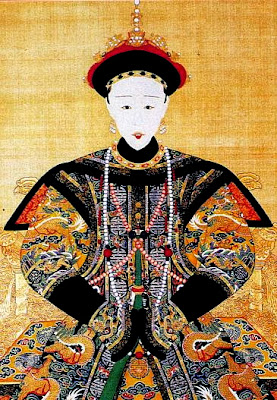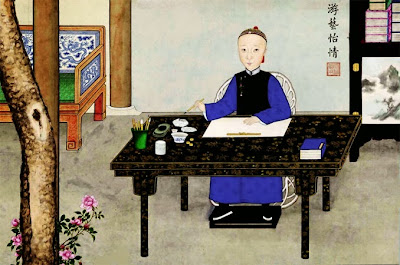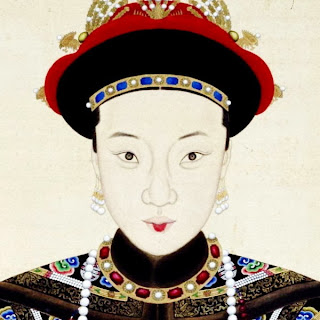Cixi: The Woman Behind The Throne
The concubine who became China's last empress
History can be a slippery substance, particularly when it comes to personalities. A century after the death of China's last and most famous empress, Cixi, the story of her life and reign remains veiled by varying versions of the truth.
Some sources paint her as a veritable wicked witch of the east, whose enemies often mysteriously dropped dead. Others link her to tales of sexual intrigue within the palace walls, even questioning whether her favorite eunuch was truly a eunuch. But recent scholarly analyses discredit many of those sensational stories and suggest a more complicated woman than this caricature.
What do we really know about this woman who indirectly controlled China's throne for almost half a century, in the twilight of the Qing dynasty? She entered history on November 29, 1835 as a rather ordinary Chinese girl named Yehenara, although there was a certain prestige in being born to a family from the ruling Manchu minority. At age 16, she was brought to the Forbidden City to join Emperor Xianfeng's harem—which may sound like punishment to modern ears, but was considered a swank role for Chinese women of her time.
 Daniele Vare's book, The Last Empress,
Daniele Vare's book, The Last Empress, says Yehenara (he calls her Yehonala) rose to the top of the concubine ranks when the emperor overheard her singing and asked to see her. Infatuated, he began picking her name from the nightly roster of choices to visit his bedchamber, and soon she bore him a son. This earned her the title Tzu Hsi, meaning "empress of the western palace," spelled Cixi these days.
When Xianfeng died in 1861, Cixi's five-year-old son was his only male heir and became the emperor Tongzhi, making her the "empress dowager" and a regent ruler.
Cixi relinquished the regency when her son turned 17, but Tongzhi died two years later and Cixi became a regent again, this time for her three-year-old nephew Guangxu.
Some historians have pointed to this turn of events as proof of Cixi's political shrewdness because it defied tradition for the new emperor to be of the same generation as his predecessor.
Also, although Tongzhi had no heir when he died, his first-ranking concubine, Alute, was pregnant. So it seems far too convenient that Alute and her unborn child died during the debate over succession. The court announced it as a suicide, but as the New York Times reported at the time, the circumstances "aroused general suspicion."
Even if Alute was murdered, Cixi wasn't necessarily responsible, as author Sterling Seagrave points out. The late emperor had five brothers, princes of the imperial court, who had their own rivalries and ambitions for controlling the throne indirectly.
By Amanda Bensen
Smithsonian.com, March 01, 2008
Tz'u-hsi (1835-1908), concubine to the Hsien-feng emperor and later empress dowager, was the power behind the throne in
Tz'u-hsi, who is also known as Yehonala, Empress Hsiao-ch'in, or "The Old Buddha, " was born on Nov. 29, 1835.
At the age of 16 she became a low-ranking concubine to the Hsienfeng emperor (reigned 1851-1861), but in 1856, when she gave birth to the Emperor's only son and heir, she was made a second-class concubine.
When the Emperor died on Aug. 22, 1861, in Jehol, where he had fled before the allied British and French advance on
During his minority the new emperor, according to his father's will, would rule through a regency, but all decrees had to be approved by the two empress dowagers - his mother and the senior consort Empress Tz'u-an.
The ensuing power struggle between the regents and the two empress dowagers, with the aid of Prince Kung (the deceased emperor's half brother), was resolved in favor of the two women when the court returned to Peking in October 1861. The regents were arrested, and the two empress dowagers formed a joint regency. Prince Kung was made prince counselor and head of the Grand Council.
Of the two dowager empresses, Tz'u-hsi was the more able and ambitious and gradually gained control of the state. She entrusted military power to Tseng Kuo-fan, Li Hung-chang, and Tso Tsung-t'ang and in international affairs relied on Prince Kung and Wen-hsiang in the Tsungli Yamen. She loved money and power, had tremendous physical vitality, used the weaknesses of her officials for her own ends, and in matters of state was extremely realistic.
When Prince Kung appeared to be acquiring too much power in 1865, she had him removed from all his offices on a pretext. He was later restored to power but was no longer prince counselor. Tz'u-hsi was strongly anti-Western and conservative but permitted a limited amount of Westernization in order to preserve her own power and the dynasty.
When Prince Kung appeared to be acquiring too much power in 1865, she had him removed from all his offices on a pretext. He was later restored to power but was no longer prince counselor. Tz'u-hsi was strongly anti-Western and conservative but permitted a limited amount of Westernization in order to preserve her own power and the dynasty.
 When the T'ung-chih emperor died in 1875, from excesses, which his mother seems to have encouraged, Tz'uhsi placed her 3-year-old nephew on the throne as the Kuang-hsü emperor (1875-1908), with Empress Dowager Tz'u-an (née Niuhuru 鈕古祿, 1837-1881)and herself once again acting as regents. This was a direct violation of the dynastic law of succession, as the new emperor should have been chosen from the next generation, but Tz'u-hsi was able to crush all opposition. When Tz'u-an died suddenly in 1881, Tz'u-hsi became the sole regent and autocrat.
When the T'ung-chih emperor died in 1875, from excesses, which his mother seems to have encouraged, Tz'uhsi placed her 3-year-old nephew on the throne as the Kuang-hsü emperor (1875-1908), with Empress Dowager Tz'u-an (née Niuhuru 鈕古祿, 1837-1881)and herself once again acting as regents. This was a direct violation of the dynastic law of succession, as the new emperor should have been chosen from the next generation, but Tz'u-hsi was able to crush all opposition. When Tz'u-an died suddenly in 1881, Tz'u-hsi became the sole regent and autocrat.Usurpation of Power
The Emperor reached his majority in 1889, and Tz'uhsi relinquished nominal control of
Under the influence of his tutor Weng T'ung-ho and the reformer K'ang Yu-wei, the Emperor began to put through a series of much-needed Western-style reforms early in the summer of 1898. As these reforms would have been a threat to her power position, on Sept. 22, 1898, Tz'u-hsi, through a coup d'etat, once more assumed full powers as regent and placed the Emperor in confinement - where he remained until his death in 1908.
The Boxer Uprising in the summer of 1900, which forced Tz'u-hsi to flee to Sian when an eight-nation allied force occupied Peking, resulted in Tz'u-hsi's final acceptance of the need for reforms, the same reforms that her nephew had tried to implement 2 years earlier. The most far-reaching of these was the abolition of the old-style examinations in 1905.
Tz'u-hsi died on Nov. 15, 1908 - one day after the Kuang-hsü emperor. The closeness of their deaths occasioned rumors of foul play, but whether he died a natural death or was murdered has never been determined.
Historical Opinion
The lavish palaces, gardens and lakes built by Cixi were hugely extravagant at a time when
It is argued by some that one must not confuse the traditional Confucian idea widely held in Empress Dowager Cixi's day, that influential women caused trouble and were not to be trusted, with her frequent portrayal as a despot. While other powerful women of Chinese history, e.g. Empress Wu Zetian of the Tang Dynasty, are generally positively reassessed by modern historians, the negative views on Empress Dowager Cixi largely remain.
Katherine Carl
In her book, Katherine Carl describes the Empress Dowager Cixi as a kind and considerate woman for her station. Empress Dowager Cixi, though shrewd, had great presence, charm, and graceful movements resulting in "an unusually attractive personality".
Carl wrote of the Dowager's love of dogs and of flowers, as well as boating, Chinese opera and her Chinese water pipes and European cigarettes. Carl also made note of Empress Dowager Cixi's loyalty, describing the case of "a Chinese woman who nursed Her Majesty through a long illness, about twenty-five years since, and saved her life by giving her mother's milk to drink. Her Majesty, who never forgets a favor, has always kept this woman in the Palace. Being a Chinese, she had bound feet. Her Majesty, who cannot bear to see them even, had her feet unbound and carefully treated, until now she can walk comfortably. Her Majesty has educated the son, who was an infant at the time of her illness, and whose natural nourishment she partook of. This young man is already a Secretary in a good yamen (government office)."
Sterling Seagrave
Seagrave argues that most of the more sensational stories of Empress Dowager Cixi's life can be traced to the boasting, self-important "Wild Fox" Kang Youwei and his cronies, who having never having met the Empress Dowager, concocted stories of plots and poisonings and passed them on to the Western press. Many other "details" of her life are based on accounts by J.O.P. Bland and known forger Edmund Backhouse.As life in the
In contrast, Seagrave portrays Empress Dowager Cixi as a woman stuck between the xenophobic Ironhats faction, made up of Manchu nobility wanting to maintain Manchu dominance and remove Western influences from
Princess Der Ling
Der Ling, whose Christian name was Elisabeth Antoinette, was born in Beijing in June 1885 and died in Berkeley, California in November 1944. She was the eldest daughter of Yu Keng, an official of the Chinese-Martial (hanjun) Plain White Banner, and his wife, Louisa Pierson, daughter of an American merchant in Shanghai and his Chinese consort.
When Der Ling's father was recalled from Paris, where he had been Chinese minister, in 1903, Der Ling, her sister Rong Ling (later the wife of General Dan Paochao) and their mother were summoned by Cixi to become court ladies – something between ladies in waiting and translators/hostesses for when the Empress Dowager had foreign female guests from Beijing's Legation Quarter.
Der Ling served at court from March 1903 till October 1905, and married an American, Thaddeus Cohu White, in 1907.
After Cixi's death in 1908, Der Ling professed to be so angered by what she saw as false portraits of Cixi appearing in books and periodicals that she wrote her own account of serving "Old Buddha," which she called "Two Years in the Forbidden City." This book appeared in 1911, just before the fall of the Qing Dynasty, and was a popular success.
In this book, Cixi is not the monster of depravity depicted in the popular press and in the second and third hand accounts left by foreigners who had lived in Beijing, but an aging woman who loved beautiful things, had many regrets about the past and the way she had dealt with the many crises of her long reign, and apparently trusted Der Ling enough to share many memories and opinions with her.
It was clearly Cixi's favoritism toward Der Ling, including permitting her to wear a "princess button" on her hat, that prompted Der Ling in later years, when seeking an English equivalent to her office at court, to add "Princess" to her name, a move that undermined her credibility in China even as it drove up her stock when she went before the American public in the 1920s to give lectures about life at court with the semi-legendary Cixi. Der Ling ultimately wrote a full-length biography of Cixi titled 'Old Buddha.'
Der Ling would go on to write seven more books about this relatively brief period in her youth when she had been close to the centre of failing imperial Chinese power, and sharing this personal history and her habit of promoting herself and her writings caused most of her family to turn against her. All of this has made it difficult to assess Der Ling's contribution to late Qing historiography.
But the fact remains that she was the first woman of Cixi's own ethnic background to live with and observe her and then write about what it was like; if many of Der Ling's recollections smack of the every day minutiae of a court that throve on details and form, her writings are no less valuable for focusing on them, particularly as life within the Forbidden City and the Summer Palace was a closed book for most people in China, let alone in the rest of the world. It was misunderstanding of much of what emanated from the throne that created so many of the problems Cixi has been wholly blamed for.
Starting with Sterling Seagrave's biography of Cixi, 'Dragon Lady: The Life and Legend of the Last Empress of China', Der Ling and her reminiscences of the imperial court have been rehabilitated in recent years, in tandem with reassessments of the Empress Dowager herself. In January 2008, Hong Kong University Press published the first biography of Der Ling, 'Imperial Masquerade: The Legend of Princess Der Ling'.
Other sources
Another sympathetic account can be found in Anchee Min's historical novels Empress Orchid (2004) and The Last Empress (2005), and she appears frequently in ceremonies described in the diaries of Sir Ernest Satow for 1900-06 when Satow was British envoy in
The China Central Television production Towards the Republic portrayed Empress Dowager Cixi as a capable ruler, albeit not entirely positive, for the first time in the history of Mainland Chinese television, although it also clearly demonstrated her political views as very conservative.
Pearl S. Buck's novel Imperial Woman chronicles the life of the Empress Dowager from the time of her selection as a concubine until near to her death. Empress Dowager Cixi is portrayed as a stern, motivated woman who stands to the old ways of life and government and resists the changes brought by westerners. Empress Dowager Cixi's actions on behalf of the two Emperors that she raised and her own actions are all accounted for and rationalized as being for the good of her people and her country.
 "Too much mystery surrounds the Forbidden City for us to write of its inmates with assured authority. Even when the facts are known, there are two or three versions, each giving a different rendering of what occurred. This vagueness is like the nebulous parts of a Chinese painting; it has a charm that it might be a mistake to dispel. Nor is it certain that the historian, could he lift the veil, would discover the truth."
"Too much mystery surrounds the Forbidden City for us to write of its inmates with assured authority. Even when the facts are known, there are two or three versions, each giving a different rendering of what occurred. This vagueness is like the nebulous parts of a Chinese painting; it has a charm that it might be a mistake to dispel. Nor is it certain that the historian, could he lift the veil, would discover the truth."—Daniele Vare, an Italian diplomat in Peking, in his 1936 biography of Cixi,"The Last Empress"










No comments:
Post a Comment